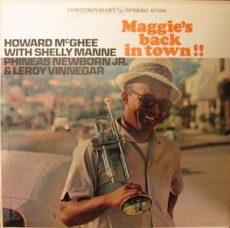
Requisites
Maggie’s Back In Town ~ Howard McGhee | By Eddie Carter
Howard McGhee opens this morning’s discussion with a superb 1961 album, Maggie’s Back In Town (Contemporary Records M3596/S7596). He was one of the earliest jazz musicians to begin playing bebop and became a leading trumpet player during the Forties. Howard was also an excellent arranger and composer who performed with some of the elite musicians during that era. Drug problems derailed his career during the fifties, but he returned in 1960 and recorded two impressive albums for Lester Koenig’s label. A first-class trio joins him on this studio session: Phineas Newborn Jr. on piano, Leroy Vinnegar on bass, and Shelly Manne on drums. My copy is the 1975 US Stereo reissue.
Side One opens with a Howard McGhee original, Demon Chase. The quartet swings easily into the melody; then, Howard gets to the song’s core first. Phineas follows happily along in the second reading. McGhee returns on muted horn with a solo that’s sheer heaven. Leroy closes things out ahead of the finale. Willow Weep For Me by Ann Ronell is one of the most beautiful and recorded song’s from The Great American Songbook. Newborn makes the introduction segueing into McGhee’s muted slow-tempo theme and mellow opening statement. Phineas demonstrates tenderness and intimacy next, and then Howard takes the song out thoughtfully with the mute removed.
Softly, As In a Morning Sunrise by Sigmund Romberg and Oscar Hammerstein II is taken at a brisk clip, with the leader’s mute building the melody effectively. Howard delivers the song’s only solo with joyful vitality fueled by the trio’s exceptional support ahead of the closing chorus and climax. Sunset Eyes by Teddy Edwards ends the first side. The rhythm section sets the scene for McGhee’s easygoing melody. The tempo moves upward for a fascinating interpretation by the leader. Newborn also puts together a well-constructed offering preceding the closing chorus and gentle fadeout.
Side Two starts with Maggie’s Back In Town, by Teddy Edwards. The title refers to Howard’s nickname and his return to the jazz scene after battling drug addiction. The quartet’s bluesy theme gets things underway, followed by Howard’s warm welcome in the first solo. Newborn’s second statement is as delicious as a good meal. McGhee returns for a short reading, and then Vinnegar takes a relaxing walk. Manne shares the closing statement with Howard ahead of the ending theme. Summertime by George and Ira Gershwin and DuBose Heyward starts at mid-tempo, with the leader back on a muted trumpet. McGhee’s solo is as enjoyable as a day at the seaside until the close.
Brownie Speaks by Clifford Brown takes off with the foursome’s vigorous uptempo workout. Howard generates plenty of heat in the first solo. Phineas takes a scintillating statement next. Leroy follows with a short, robust comment, and the leader’s finale flows vibrantly toward the climax. Lester Koenig produced Maggie’s Back In Town, and Roy DuNann was the recording engineer. It’s a great-sounding reissue with an outstanding soundstage that brings the quartet to your listening room with stunning fidelity. If you’re in the mood for a hard-bop album with great tunes and tight musicianship, I invite you to check out Maggie’s Back In Town by Howard McGhee on your next record shopping trip. It’s an excellent introduction to his music and a terrific album that’s sure to give you many hours of listening pleasure!
~ Together Again! (Contemporary Records M3588/S7588) – Source: Discogs.com ~ Softly, As In A Morning Sunrise, Summertime, Willow Weep For Me – Source: JazzStandards.com © 2023 by Edward Thomas Carter
More Posts: choice,classic,collectible,collector,history,instrumental,jazz,music,trumpet
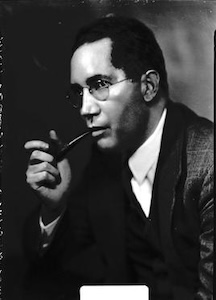
Jazz Poems
CABARET (1927, Black & Tan Chicago) Rich, flashy, puffy-faced, Hebrew and Anglo-Saxon, The overlords sprawlhere with their glittering darlings, The smoke curls thick, in the dimmed light Surreptitiously, deaf-mute waiters Flatter the grandees, Going easily over the rich carpets, Wary lest they kick over the bottles Under the tables. The jazzband unleashes its frenzy. Now, now To it Roger; that’s a nice doggie Show your tricks to the gentlemen The trombone belches, and the saxophone Wails curdingly, the cymbals clash, The drummer twitches in an epileptic fit Muddy water Round my feet Muddy water The chorus sways in. The “Creole Beauties from New Orleans” (By way of Atlanta, Louisville, Washington, Yonkers, With stop-overs they’ve used nearly all their lives) Their creamy skin flushing rose warm O, le bal des belle quarterounes! Their shapely bodies naked save For tattered pink silk bodices, short velvet tights, Red bandanas on their sleek and close-clipped hair; To bring to mind (aided by the bottles under the tables) Life upon the river— Muddy water, river sweet (Lafitte the pirate, instead, And his doughty diggers of gold) There’s peace and happiness there I declare (In Arkansas, Poor half-naked fools, tagged with identification numbers, Worn out upon the levees, Are carted back to the serfdom They had never left before And may never leave again Bee—dap—ee-–DOOP, dee—ba—dee—BOOP The girls wiggle and twist Oh you too, Proud high-stepping beauties Show your paces to the gentlemen. A prime filly, seh. What am I offered, gentlemen, gentlemen…. I’ve been away a year today To wander and roar I don’t care if it’s muddy there (Now that the floods recede, What is there left the miserable folks? Oh time in abundance to count their losses, There is so little else to count.) Still it’s my home, sweet home From the lovely throats Moans and deep cries for home: Nashville, Toledo, Spout Springs, Boston, Creoles from Germantown;— The bodies twist and rock; The glasses are filled up again…. (In Mississippi The black folk huddle, mute, uncomprehending Wondering “how come the good Lord Could treat them this a way”) shelter Down to the Delta (Along the Yahoo The buzzards fly over, over, low Glutted, but with their scrawny necks stretching, Peering still.) I’ve got my toes turned Dixie ways Round that Delta let me laze The band goes mad, the drummer throws his sticks At the moon, a papier-maché moon, The chorus leaps into weird posturings, The firm-fleshed arms plucking at grapes to stain Their corralled mouths; seduction bodies weaving Bending, writhing, turning My heart cries out for MUDDY WATER (Down in the valleys The stench of the drying mud Is a bitter reminder of death Dee da dee DAAAAH STERLING A. BROWNfrom Jazz Poems | Selected and edited by Kevin Young
More Posts: book,classic,collectible,history,jazz,library,poet
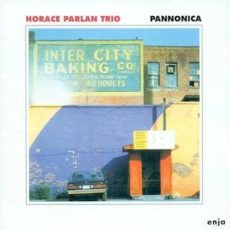
Requisites
Pannonica ~ Horace Parlan Trio | By Eddie Carter
This morning’s album is by Horace Parlan, a pianist whose roots were deep in hard bop. I fell in love with his playing after hearing Movin’ & Groovin’ and The Complete Horace Parlan Blue Note Sessions. Pannonica (Enja Records 4076) is a 1984 release capturing The Horace Parlan Trio in performance at the Munich jazz club, The Domicile, on February 11,1981. Horace was stricken with polio as a child, resulting in the partial crippling of his right hand. It contributed to his developing a left-hand chord-voicing style and an ability to play rhythmic phrases with the right. He’s joined on stage by Reggie Johnson on bass and Alvin Queen on drums. My copy is the original German Stereo album.
No Greater Love, an abbreviation of the title There Is No Greater Love by Isham Jones and Marty Symes, begins the set with the trio’s energetic melody. Horace launches into a highly satisfying opening solo. Reggie comes in behind him with a vigorous statement. Alvin engages in an aggressive exchange with the pianist before the reprise and climax. The title tune, Pannonica, by Thelonious Monk, is one of his most beautiful compositions and opens with a solo piano introduction, segueing into the threesome’s delicately soft theme. Parlan treats the standard tenderly in the only solo, complemented by Johnson and Queen’s lush foundation into a gentle ending.
The first side closes with an enthusiastic rendition of C Jam Blues by Duke Ellington and Barney Bigard. The trio goes right to work with a lively melody. Horace leads the way with a vigorous solo. Reggie says his piece in the following reading. Alvin adds a bit of excitement in a spirited interpretation leading to the ensemble’s splendid finale. Randy Weston’s Hi-Fly starts Side Two with the trio’s inspired theme. Parlan is up first and stretches out in a beautifully constructed opening statement. Johnson takes the next turn, displaying an exemplary flow of ideas that builds to an effective climax.
The album closes with an old thirties song by George and Ira Gershwin, Who Cares? The trio opens with a medium-tempo melody as fresh as the fragrance after a summer rain shower. Horace takes the lead and brings out the sun in the first solo. Reggie responds with a compelling reading that flows nicely into the theme’s reprise and finish. Horst Weber and Matthias Winckelman produced Pannonica, and Carlos Albrecht recorded the album. This digital recording has an impressive soundstage that makes the instruments come alive through your speakers and places the listener in The Domicile audience as the musicians are performing.
Horace Parlan was one of jazz’s elder statesmen who constantly explored the individual possibilities of each tune he played with a sureness in his approach, which fueled his ability to improve with each new album continually. He, Reggie Johnson, and Alvin Queen make a fine team and demonstrate what a piano, bass, and drums could accomplish when firing on all cylinders. If you’re a fan of trio jazz, I invite you to consider Pannonica by The Horace Parlan Trio on your next record hunt. It’s one of the pianist’s best records and a very entertaining set that shouldn’t be missed for a spot in your library!
More Posts: choice,classic,collectible,collector,history,instrumental,jazz,music,piano
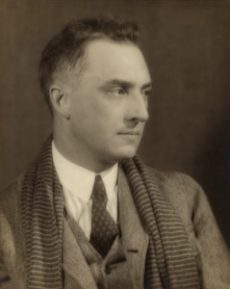
Jazz Poems
OL’ BUNK’S BAND These are men! the gaunt, unfore- sold, the vocal, blatant, Stand up, stand up! the slap of a bass-string Pick, ping! The horn, the hollow horn long drawn out, a hound deep tone— Choking, choking! while the treble reed races–alone, ripples, screams slow to fast— to second to first! These are men! Drum, drum, drum, drum, drum drum, drum! the ancient cry, escaping crapulence eats through transcendent—torn, tears, term town, tense, turns and back off whole, leaps up, stomps down, rips through! These are men beneath whose force the melody limps— to proclaim—Run and lie down, in slow measures, to rest and not never need no more! These are men! Men!WILLIAM CARLOS WILLIAMS
from Jazz Poems | Selected and edited by Kevin Young
More Posts: book,classic,collectible,history,jazz,library,poet
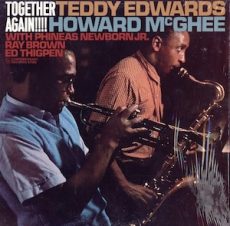
Requisites
Together Again!!!! ~ Teddy Edwards and Howard McGhee | By Eddie Carter
Teddy Edwards and Howard McGhee enter this morning’s spotlight with their excellent 1961 collaboration, Together Again!!!! (Contemporary Records M3588/S7588). The tenor saxophonist and trumpeter initially worked together from 1945 to 1947 when Edwards was a member of McGhee’s sextet. It’s their second collaboration since the Bebop era, but the first time the duo recorded together. The supporting cast is a magical rhythm section: Phineas Newborn Jr. on piano, Ray Brown on bass, and Ed Thigpen on drums. My copy is the 1975 U.S. Stereo reissue, sharing the original catalog number.
The album opener is the title track, Together Again, by Teddy Edwards. The quintet begins the melody harmonizing in perfect agreement. Howard takes the wheel and cruises leisurely on the opening statement. Teddy wails with a vibrant voice in the following solo. Phineas heightens the excitement with an impressive reading; then Ray adds a brisk footnote leading to the theme’s return and summation. McGhee introduces You Stepped Out Of A Dream by Nacio Herb Brown and Gus Kahn on the muted trumpet. He showcases the horn’s warm, lyrical tone in a lighthearted setting during two solos. In between them, Edwards gives a charming reading that bounces along over the rhythm section.
Up There by Ray Brown opens briskly from the pianist’s introduction, which evolves into the ensemble’s aggressive theme. Teddy tackles the first solo with fleet agility, and then Howard flies swiftly in the second statement. Phineas swings with a vengeance until the group’s theme restatement and abrupt finish. Side Two begins with Perhaps by Charlie Parker, featuring McGhee on muted trumpet during the opening and closing chorus. Edwards builds the opening solo exquisitely. Newborn follows with an exceptional interpretation. McGhee opens the horn for a passionately nimble reading, and Ray delivers the exclamation point into the group’s exit.
Teddy and the trio have the honors next on Misty by Erroll Garner and Johnny Burke. The quartet starts with a bass and piano duet. Teddy and Ed join them for the song’s very pretty melody. Edwards is the song’s only soloist and delivers an intimately personal interpretation that, to these ears, is one of the album’s highlights. Sandy by Howard McGhee begins with the quintet’s energetic theme. Howard is off to a rousing start on the lead solo. Edwards follows him with a reading of confident assurance. Newborn goes for the jugular next with vigorous enthusiasm. Brown wraps up the solos with dazzling bass lines preceding the quintet’s return to take the song out.
Lester Koenig produced Together Again!!!!, and Roy DuNann was the recording engineer. The reissue sounds great and possesses a vibrant soundstage, allowing the musicians to emerge from your speakers into your listening room with superb fidelity! Throughout the album, the quintet demonstrates how good West Coast jazz could sound in the right hands. The music is great from start to finish, and the musicians complement each other skillfully. If you’re a fan of Cool Jazz or Post Bop, I invite you to consider Together Again!!!! by Teddy Edwards and Howard McGhee on your next record-shopping trip. It offers the opportunity to appreciate two jazz giants who, after an absence of sixteen years, prove that great music doesn’t have an expiration date and can provide listening pleasure endlessly!
~ You Stepped Out of a Dream, Misty – Source: JazzStandards.com
~ Perhaps – Source: Wikipedia.org
© 2023 by Edward Thomas Carter
More Posts: choice,classic,collectible,collector,history,instrumental,jazz,music,saxophone,trumpet



